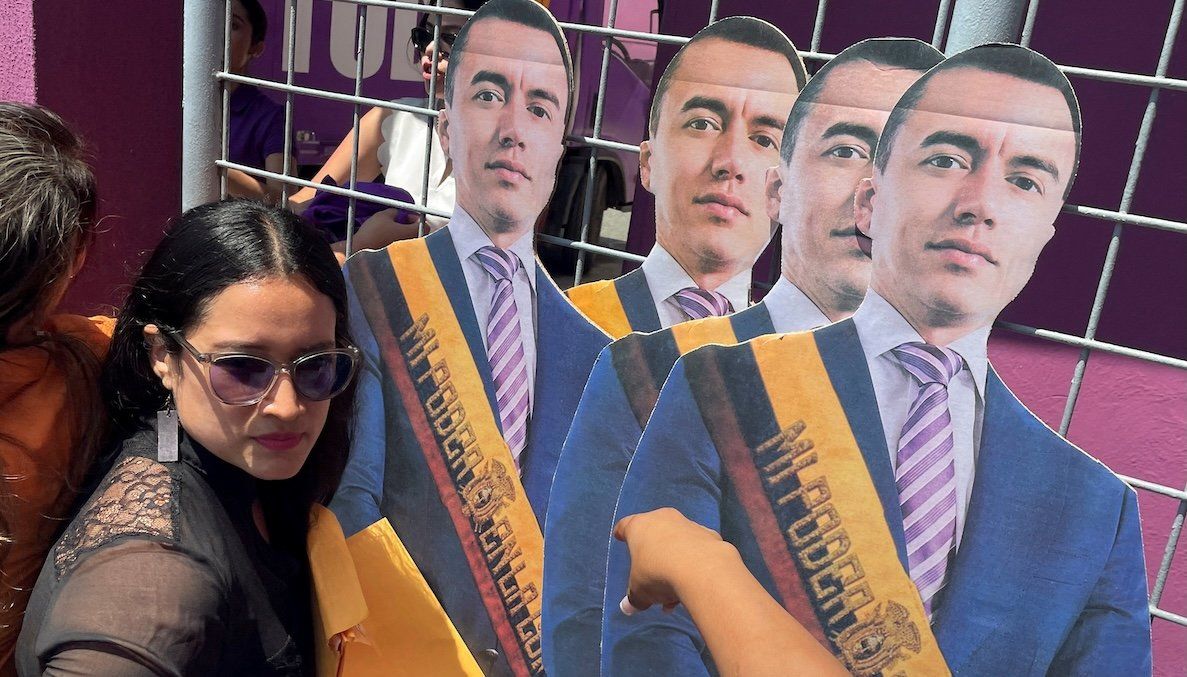Ecuadorians will head to the polls on Feb. 9 to choose their next president against a backdrop of spiraling violence similar to that of the last presidential election in 2023. That was an early vote called by then-President Guillermo Lasso in an attempt to avoid impeachment. Daniel Noboa, the fresh-faced son of a banana magnate, achieved an upset victory, assumed the presidency, and launched an aggressive crackdown against the drug trafficking gangs terrorizing the country.
Less than two years later, the 38-year-old president is asking for a full term in office (four years) in this weekend’s regularly scheduled election. Noboa says he wants to finish what he started, and his clear lead in the polls suggests that voters are inclined to give him the opportunity. We sat down with Eurasia Group expert Risa Grais-Targow to learn more about the upcoming election.
What are voters’ biggest concerns?
The main issue by far is security, followed by economic concerns. There was a crisis of electricity outages toward the end of last year, but that has been abated by recent rains (the country is heavily dependent on hydropower) and fallen lower on the list of voter concerns. However, there has been a renewed deterioration of the security situation, and the start of this year has been one of the most violent ever.
What is driving this violence? Are political candidates being targeted, as in 2023?
No high-profile candidates have been targeted this time (presidential hopeful Fernando Villavicencio was shot and killed in 2023), but some local officials have been killed and there may be a political motive behind the latest wave of violence. Noboa has really made the fight against organized crime a pillar of his presidency. When he took office in January 2024, he declared a state of emergency, brought the military out onto the streets, and took control of the country’s prisons, which had been a hotbed of criminal activity. So criminal groups may be intensifying their battles for control of drug-transit routes partly in the hope that the resulting uptick in violence will lead voters to conclude the president’s approach is not working.
Is it working? Given these still high levels of violence under Noboa, why is he leading in the polls?
Noboa’s policies initially brought a dramatic decline in homicide rates and other violence. Since then, it’s possible that criminal groups found ways to work around them. Still, levels of violence are lower than at their late 2023 peak. More broadly, voters support Noboa’s policies and believe that he is doing the right thing or trying to do the right thing. They think he needs more time. He's only been in office for just over a year, so I think voters are still, at this juncture, willing to give him the benefit of the doubt.
Are there other reasons for this high level of support for Noboa?
I think that he is still viewed by voters as a bit of an outsider, someone who is shaking up Ecuadorian politics. He came out of nowhere in 2023 to win the election. He's very young and still kind of feels like a fresh face. The other thing he has going for him is that his main opponent, Luisa Gonzalez, is not a strong candidate with a clear message on the issues voters care about. She represents the correismo movement launched by former president Rafael Correa, which has a very loyal base but also is strongly disliked by some parts of the electorate.
What has happened to correismo? It used to be a dominant force in Ecuadorian politics, but its fortunes seem to have declined in the last couple of elections.
The movement has struggled to come up with a compelling forward-looking campaign message, focusing more on attacking Noboa and peddling nostalgia about conditions during Correa’s time in office (2007-2017). Moreover, the country’s security crisis has focused attention on decisions Correa made such as expelling the US military from the base in Manta. Similarly, the country’s current reliance on hydropower and shaky electricity grid stems from decisions made under Correa, including his flagship Chinese-built Coca Codo Sinclair hydroelectric dam, which has major structural problems.
At the same time, Noboa’s young National Democratic Action party seems to be consolidating its position. What is the significance of this?
Ecuadorian politics seems to be consolidating around two main parties, National Democratic Action and Correismo, which marks a departure from its typical fragmentation. This can be a stabilizing force for a country with a long history of political instability and volatility.
What are some things Ecuador’s next president could do to address the country’s problems?
Noboa wants to amend the constitution to allow foreign military bases in Ecuador, reversing the policy instituted by Correa. The country is doing battle with multinational criminal organizations – the groups in Ecuador report, for example, to Mexico’s Sinaloa cartel – so having foreign military and intelligence assistance is potentially a big deal. This is a popular idea locally but will need to be put to a public referendum. In terms of electricity supply, Noboa has been changing regulations to stimulate investment in new generation capacity, and I think if he is elected to a new four-year term, that could help get some of these projects moving. Finally, under the terms of the country’s financial support package from the IMF, the next president will have to raise tax revenue and cut back on fuel subsidies. The latter is a particularly challenging issue that has prompted mass public protests in the past.
Edited by Jonathan House, Senior Editor, Eurasia Group
